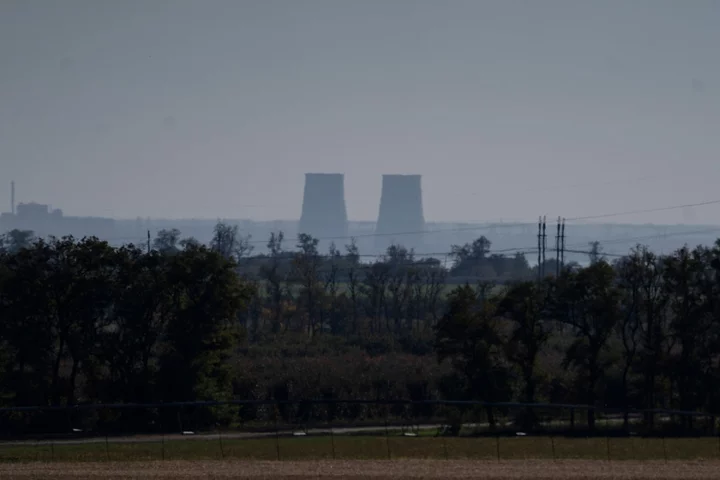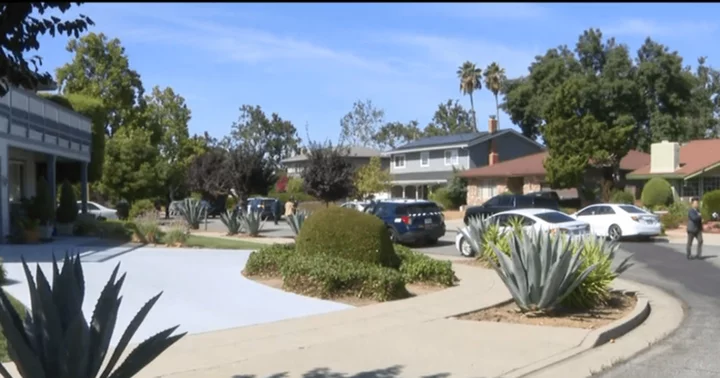Russia is plotting a “large-scale provocation” at a nuclear power station it occupies in the south-east of Ukraine to disrupt an imminent counteroffensive, Kyiv’s military intelligence has claimed.
A statement from the intelligence directorate of Ukraine’s defence ministry claimed Russian forces will strike the Zaporizhzhia nuclear power plant, the biggest in Europe.
It will then report a radioactive leak in order to trigger an international probe that would pause the hostilities and give them the respite they need to regroup.
In order to make that happen, Russia “disrupted the rotation of personnel of the permanent monitoring mission” of the UN’s International Atomic Energy Agency (IAEA) that was scheduled for Saturday, the statement said. It did not offer evidence to back up any of the claims.
The IAEA said it did not have any immediate comment on the allegations and Russian officials did not immediately comment on the Ukrainian claims.
The White House said it is watching the situation closely and has seen no indication radioactive material has been leaked.
It comes as Moscow’s military in Ukraine braces for a looming counteroffensive by Kyiv’s forces, which has not started yet but could begin “tomorrow, the day after tomorrow or in a week”, the secretary of Ukraine’s National Security and Defence Council, Oleksiy Danilov, told the BBC.
He said the government in Kyiv had “no right to make a mistake” on the decision because this is a “historic opportunity” that “we cannot lose”.
The Zaporizhzhia station is one of the 10 biggest nuclear plants in the world. It is in the partially occupied Zaporizhzhia region in south-eastern Ukraine.
The plant’s six reactors have been shut down for months but it still needs power and qualified staff to operate crucial cooling systems and other safety features.
Fighting near it repeatedly disrupted power supplies and has fuelled fears of a potential catastrophe like the one at Chernobyl, in northern Ukraine, where a reactor exploded in 1986 and spewed deadly radiation, contaminating a vast area.
In other developments on Saturday, Russia reported more attacks on its territory, with drones crashing in its western regions and areas on the border with Ukraine coming under shelling.
Two drones attacked an administrative building of an oil company in Russia’s western Pskov region that borders Belarus, Latvia and Estonia, Pskov governor Mikhail Vedernikov reported on Saturday.
The building was damaged as the result of an explosion, Mr Vedernikov said.
Another drone went down in the Tver region about 90 miles north of Moscow, local authorities said.
Russia’s Belgorod region on the border with Ukraine came under multiple rounds of shelling on Saturday, killing one person, according to its governor Vyacheslav Gladkov.
In the neighbouring Kursk region, which also borders Ukraine, one person was killed by cross-border mortar fire, its governor Roman Starovoit said.
And a 60-year-old man was killed by Russian shelling in the city of Kupyansk in the Kharkiv region, about 20 miles from the Russian border, Ukraine’s national police said.
Meanwhile, Russia’s ambassador to the UK Andrei Kelin warned his country was yet to “act very seriously” in the conflict.
Mr Kelin told the BBC that Moscow had “enormous resources” and the country was “16 times bigger than Ukraine.”
He said: “Sooner or later, of course, this escalation may get a new dimension which we do not need and we do not want. We can make peace tomorrow.”
In addition, the British military said on Saturday that Russia’s private military force, Wagner, is withdrawing from areas around the eastern city of Bakhmut that Moscow claims to have captured earlier this month.
Wagner chief Yevgeny Prigozhin earlier this week announced the pullout, saying Wagner would hand control over the ruined city over to the Russian military. Some were sceptical, however.
Mr Prigozhin is known for making unverifiable, headline-grabbing statements on which he later backtracks.
But Britain’s Ministry of Defence (MoD) said in a series of tweets on Saturday that Wagner fighters “have likely started to withdraw from some of their positions” around Bakhmut.
“The Ukrainian deputy defence minister also corroborated the rotation out of Wagner forces in the outskirts of the town,” it added.
Additional reporting by agencies
Read MoreUkraine-Russia war – latest: Putin ‘plans nuclear radioactive leak to postpone counteroffensive’
Ukraine claims Russia is plotting 'a provocation' at nuclear plant, offers no evidence
Vladimir Putin’s Ukraine facade is crumbling – this week proves it
The Body in the Woods | An Independent TV Original Documentary
The harrowing discovery at centre of The Independent’s new documentary









